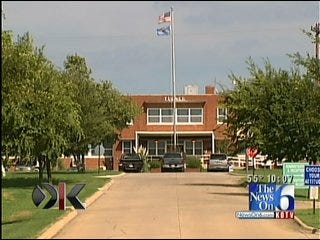Future Unclear For Oklahoma Institution For Developmentally Disabled
Families are fighting for their loved ones while state lawmakers crunch the numbers. The dilemma is whether it is worth keeping the Southern Oklahoma Resource Center, SORC, in Pauls Valley open.Monday, October 4th 2010, 10:03 pm
By Amy Lester, Oklahoma Impact Team
PAULS VALLEY, OKLAHOMA -- Families are fighting for their loved ones while state lawmakers crunch the numbers. The dilemma is whether it is worth keeping the Southern Oklahoma Resource Center, SORC, in Pauls Valley open.
"I just can't imagine him being anywhere else," said Donna Clark whose brother lives in SORC.
Donna's brother David moved to SORC 47 years ago. He has down syndrome, a hole in his heart and the mental capacity of a two year old. He receives around the clock medical care, therapy and daily living assistance. Clark worries that care outside of the institution would be inferior and that David could possibly not survive a move out of SORC.
"This is what he knows and for him to be put into basically, I consider, a foreign land, in a foreign place, I don't think he would take the transition well. I think it would be too stressful for him," said Clark.
At issue is whether the facility should close, sending its 135 residents into the community to live with their families, on their own with caregivers or in group homes. There is a dramatic price difference. DHS said at SORC, the price tag is $191,625 federal and state dollars a year per resident. They estimate, in the community, that number would drop $54,557 to $137,068 a year per person. Last legislative session, Senator Brian Crain tried to close SORC.
"I think it's incumbent for us to look and determine is this the best use of the state's money?" said Senator Crain.
He questioned the cost of the institution last session. His opinion changed once he looked at the numbers more closely and heard from families. It turns out, most of the $7.4 million saved by closing it would be federal, not state dollars. Crain does not plan to push for closure this session. However, he does not expect the state to give SORC $12 million for needed repairs to the facility.
"Those parents and guardians want to remain at SORC and I want to honor that commitment they're making to the facility by not pursuing to close it. On the other hand, I don't know where we're going to find the additional money to take care of that facility," said Crain.
Without funding, the facility will continue to deteriorate. Eventually, the State Health Department could decertify it and it would lose all federal funding. That could force it to close. DHS administrators expect, one day in the future, SORC will shut down.
"It will become so expensive to maintain the physical plant and there will be fewer people living there that it will become pretty much the obvious decision that people need to be served in an alternative location," said Jim Nicholson, Director of the DHS' Developmental Disabilities Services Division.
By alternative, Nicholson is talking primarily about out in the community or group homes. DHS currently serves 9,000 people in the community.
"If I had to do it again and knowing what I know now, I would've had him out a long time ago," said Sandy Franetovich whose son moved out of SORC 10 years ago. He had lived in the institution for two decades.
"We were really scared," said Franetovich. "We didn't know what we were getting into up here and when we finally came out and saw the house and saw the people who take care of him and everything, we were really impressed."
Franetovich said the quality of life is superior in the community where her son lives with two developmentally disabled roommates. Two caregivers are there during the day and one at night.
While the legislature determines what to do about SORC, around 5,800 developmentally disabled Oklahomans are waiting for services. They need therapies, job training, life skills coaches and group homes.
"It's scary to think for the future, what if something happened to both of us, she's not plugged into the system," said Kelly Deaver whose daughter has been on the waiting list since 2005.
Deaver is frustrated because there's no funding to help her daughter. Except for emergencies, DHS has not moved anyone off of the waiting list since 2008.
"I equate it to, if you were a parent of a six year old, who wanted to enroll them in kindergarten and you were told put them on a waiting list and eventually we'll get them in kindergarten, what's right about that? It's frustrating," said Deaver.
DHS is looking at a less costly approach to provide services to developmentally disabled Oklahomans on the waiting list. Administrators will ask the legislature for funding to help them.
Many states have moved away from institutional care because of the cost and quality of life issues. Oklahoma has closed one institution in the past. Right now, 12 states have no facilities like SORC, everyone lives in the community.
More Like This
October 4th, 2010
September 29th, 2024
September 17th, 2024
Top Headlines
December 14th, 2024
December 14th, 2024
December 14th, 2024
December 14th, 2024











